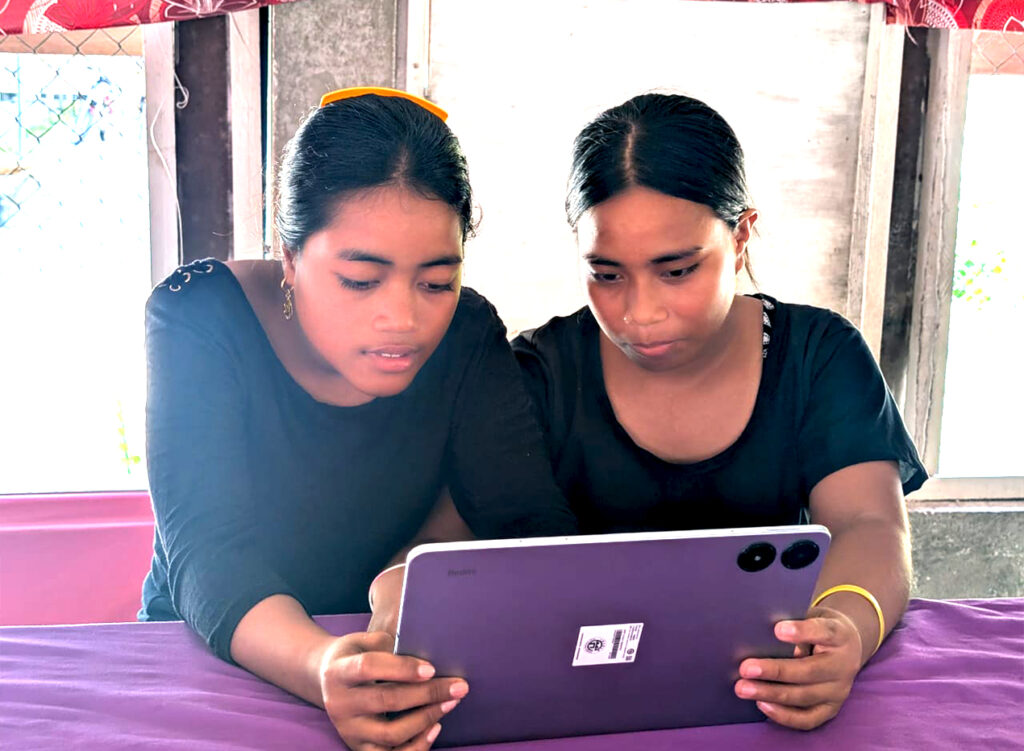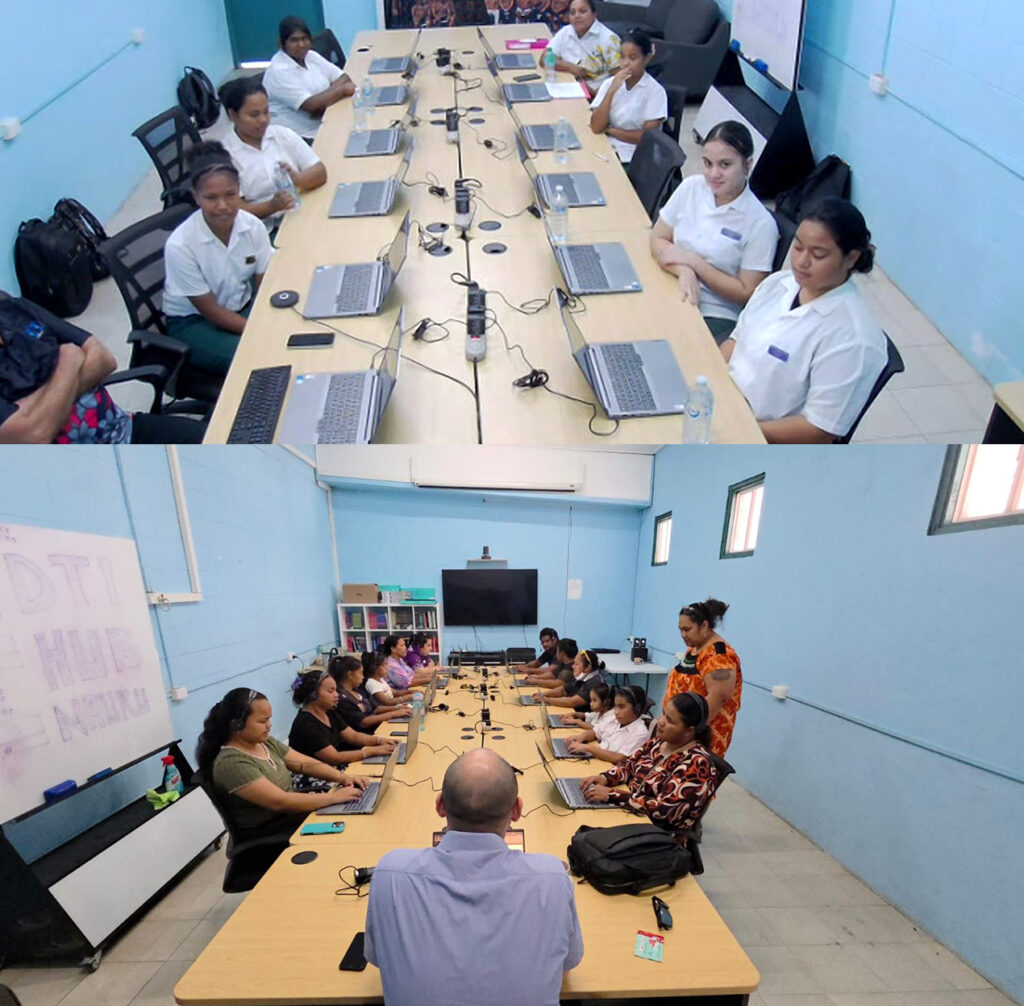
Smart Island Digital Hubs: empowering island communities in the Pacific with digital opportunities
Access to affordable connectivity and sustainable digital services can be challenging for remote and underserved communities, particularly in developing countries.
The establishment of Digital Hubs – centralized platforms that provide access to digital services, resources, and connectivity for a community – enables people who live on remote islands to have easy access to laptops and Internet connectivity. The Digital Hubs also provide regular digital skills training sessions.
The Smart Villages and Smart Islands initiative, led by the Telecommunication Development Bureau (BDT), aims to drive digital transformation at the community level. This is achieved by improving broadband connectivity and last-mile connectivity, making digital services more affordable, introducing e-commerce opportunities, boosting digital literacy and e-education, and making other digital services accessible in these communities.
This initiative covers 11 countries in Asia and the Pacific and has raised awareness among, and improved the digital skills of, around 6,300 community members to date.

Federated States of Micronesia
The Tonoas Smart Island Digital Hub was officially launched on 8 April 2025, marking a major step forward in digital empowerment for one of the Federated States of Micronesia’s most remote communities. Equipped with state-of-the-art connectivity infrastructure, the Digital Hub provides the local community with essential tools to overcome geographic isolation and limited access to online resources.
“This project has benefitted the people of Tonoas, especially students like me. We don’t have such facilities at our high school, with computers and internet for students. We really need this, especially when we are going to attend college or university and beyond,” said Seina Urumai, South Namoneas High School student, Tonoas, Federated States of Micronesia.
More than 400 community members have already received training on Tonoas – an island of just 8.8 km² and home to approximately 3,200 people.
Fiji
In Rotuma, Fiji, digital connectivity is limited, which makes it difficult for people to take advantage of e-education, e-health, e-government, and e-agricultural services.
A Digital Hub ‘Smart Classroom’ was launched in Rotuma on 16 April 2025 to help community members overcome connectivity challenges and access new digital opportunities.
“Rotuma High School is one of those schools that performs very well in external exams. However, when our students come to the mainland, they are totally lost,” said Sereana Tuapati, Principal of Rotuma High School, Rotuma, Fiji. “This is probably the greatest gift we can give these kids: to be digitally connected and to know how to use the Internet.”
In addition, a series of digital skills training sessions were held for more than 250 community members on Rotuma to improve their digital literacy from November 2024 to May 2025. Sessions covered digital skills development, online safety essentials and using digital services for education, finance, and commerce.


Kiribati
The 33 islands of Kiribati occupy a vast area in the equatorial Pacific—nearly 4,000 km from east to west and over 2,000 km from north to south.
A Digital Hub on Tamana Island, Kiribati, was launched on 4 July 2025. As a result, the community has easy access to computers, the Internet, online resources, and training, ensuring that they benefit from digital access and services.
“We are grateful that the Government chose Tamana to pilot the Smart Island project. We are confident that the Smart Island will open doors of opportunities to our youth and the wider communities,” said Ratu Karibwantaake, Mayor of Tamana Island, Kiribati.
The Digital Hub and workshops have benefited over 290 people in Tamana and 519 people across Kiribati.
The Marshall Islands
The Marshall Islands are composed of 29 atolls. Around 1,700 people reside on the Jaluit atoll, with a significant portion living in Jabwor.
Following several trainings on basic digital literacy skills, mobile Internet, and online safety, which reached more than 300 community members, a Digital Hub was opened on 25 February 2025 in Jabwor, Jaluit Atoll. By providing computers, Internet access, regular digital skills training and capacity-building sessions, the Hub is empowering community members to connect, learn, and thrive in the digital world.
“It is a great opportunity, not only for the students, but for the community as a whole. It really brings a new modern technology to the island, which we were really looking forward to, and we are so blessed to have this opportunity in Jabwor,” said an English teacher at Jaluit High School, Jabwor, Jaluit Atoll, Marshall Islands.


Nauru
Nauru is the world’s smallest island nation and faces unique connectivity challenges.
On 7 July 2025, the Digital Transformation and Inclusivity Hub was launched to expand access to the Internet and unlock its many benefits for the local community.
This milestone builds on two years of dedicated efforts. Since July 2023, more than 1,270 people have participated in a range of trainings, workshops, and information sessions. This included an online safety awareness session for over 1,100 students, as well as basic digital skills training for community members and government employees.
“The launch of the Digital Transformation and Inclusivity Hub marks an important step in Nauru’s journey towards its digital goals and ambitions. It provides an access point for citizens from all walks of life and at any stage in their digital development to unlock new skills and equip them for the future. I believe this is only a stepping stone for Nauru, and the Hub will play an instrumental role in developing the young minds of the nation,” said Hon. Shadlog Bernicke, Minister for ICT, Republic of Nauru.
Following the launch of the Digital Hub, a special session on building digital skills for persons with disabilities was held to enable them to access the digital world.
Papua New Guinea
From November 2024 to May 2025, more than 800 community members from Maprik, including Kwatgu, Waikakum, and Miko Villages, participated in digital skills training sessions which covered basic digital literacy, online safety essentials, cybersecurity, Gender Action Learning System (GALS) training, and using digital services for finance and e-commerce.
To support this training, a Digital Hub – locally known as the ‘Smart Village Resource Centre’ – was established on 27 February at Maprik Secondary School in Maprik, East Sepik Province, Papua New Guinea. The Resource Centre has enhanced the digital skills of local community members, including farmers and agricultural entrepreneurs.
“Growing up in a rural school like ours, access to technology was once just a dream. But today, thanks to the efforts of Digital Hub and the ITU Smart Village Project in Maprik, we now have the chance to explore the digital world. ICT has transformed our learning. It helps us research assignments, attend virtual classes, access educational videos, and stay connected to opportunities beyond our school walls,” said Quentine Luwe, science student (Grade 12), Maprik Secondary School, East Sepik, Papua New Guinea.


Tonga
Hunga Island faces a unique set of connectivity challenges because of its remote position as the westernmost islands in the Kingdom of Tonga’s Vava’u Archipelago.
In response, a Digital Hub ‘Smart Classroom’ was launched on Hunga Island, Vava’u, in February 2025, to provide easy access to laptops and connectivity, as well as regular digital skills training and capacity-building sessions for the people who live on this remote island.
“The Digital Hub is very beneficial for us and our community. Before, it was difficult, but today we are easily and quickly connected. Not only that, but the access point is close by, so whenever we are in need, whether it’s something urgent or emotional, it’s easy, fast, and clear,” said Falesiu Taufa, teacher, Hunga Government Primary School, Hunga, Vava’u.
Additionally, a series of digital skills training sessions was held between December 2024 and May 2025 for nearly 250 community members on the island of Hunga to improve their digital literacy. Classes covered basic digital literacy, digital skills development, online safety essentials, and using digital services for education, finance, and commerce, as well as a session on the ITU Child Online Protection guidelines.

Vanuatu
South Malekula, Vanuatu, faces challenges typical of remote island communities, including limited access to transport and digital infrastructure.
To address these gaps, digital literacy and skills training sessions were conducted from December 2020 to October 2024, reaching over 1,000 community members in South Malekula. The sessions focused on basic digital literacy, business management, cybersecurity, and e-commerce, equipping participants with the digital skills to thrive in a connected economy.
Inspired by the impact of these training sessions, the construction of a Digital Hub – locally called a ‘Business Centre’ – in Ahamb Island, South Malekula, started in October 2024 with contributions from local entrepreneurs and the local governance committee of South Malekula. Once fully completed, the Business Centre will provide reliable connectivity for Ahamb Island and the surrounding communities in South Malekula.
“Here, we are blessed with tangible tools like a projector, printing machine, laptop, smart tablets, and a smart classroom. With these resources, our teachers can prepare lessons and learning strategies that are more interactive and enjoyable for us as students. For example, lessons are projected on a screen, and we visit the smart classroom weekly to gain hands-on experience with devices such as laptops and smart tablets to enhance our ICT skills. I believe this is just the beginning of my experience, and I am confident that there is much more yet to come,” said Ms. Maifa Hairang, student (Grade 4), South Malekula Secondary School.
This is an ITU Development #DigitalImpactUnlocked story
About the Smart Villages and Smart Islands initiative
The Smart Villages and Smart Islands initiative in the Pacific is funded by the Joint SDG Fund, Asian Development Bank, the Department of Infrastructure, Transport, Regional Development, Communications, Sport and the Arts of the Government of Australia, and the Ministry of Internal Affairs and Communications of the Government of Japan and led by the ITU Telecommunication Development Bureau with support from the respective national governments, stakeholders, and UN agencies.
The “Accelerating SDG achievement through digital transformation to strengthen community resilience in Micronesia” project in Federated States of Micronesia, Marshall Islands, Nauru, Palau, and Kiribati is funded by the Joint SDG Fund, and led by the Telecommunication Development Bureau, with support from the respective national governments and UN agencies (FAO, ILO, UNESCO, UNICEF, UNOPS, and UNODC).
The “Advancing the SDGs by Improving livelihoods and resilience via economic diversification and digital transformation” project in Fiji, Solomon Islands, Tonga, Vanuatu, and Tuvalu is funded by the Joint SDG Fund, and led by the International Labour Organization, with support from the respective national governments and UN agencies (ITU Telecommunication Development Bureau, UNESCO, UNODC, UNOPS, OHCHR).
The “Smart Islands in the Pacific” project in Fiji, Papua New Guinea, Vanuatu is funded by the International Telecommunication Union and the Asian Development Bank and led by the ITU Telecommunication Development Bureau with support from the respective national governments.

